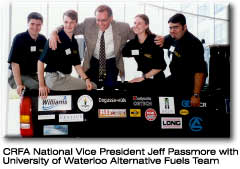 |
|||||||||
|
|
|||||||||
| New Research Shows: Ethanol Reduces Greenhouse Gas Emissions | |||||||||
A study jointly funded by Agriculture and Agri-Food Canada and Natural Resources Canada provides strong evidence of the positive contribution that ethanol, a renewable fuel manufactured from Canadian-grown corn, can make to solving the challenge of global warming. The study was con ducted by Dr. Wayne Edwards of Levelton Engineering Ltd. and Mr. Don O'Connor of (S&T)2 Consulting Incorporated. ducted by Dr. Wayne Edwards of Levelton Engineering Ltd. and Mr. Don O'Connor of (S&T)2 Consulting Incorporated.The research made use of original Canadian data for comprehensive lifecycle analysis of corn production, oil recovery, gasoline refining, ethanol manufacturing, and fuel use, including all areas of input use, transportation of intermediate products, and distribution and combustion of final products. The consultants used a sophisticated engineering model for lifecycle energy use, greenhouse gas emissions and air pollution from transportation fuels, which was developed by Mark Delucchi at the Institute of Transportation Studies, University of California. The resulting study is the most up-to-date and authoritative research currently available on GHG emissions from corn-based ethanol manufactured in Canada. The findings are impressive. Based on grams of CO2 emitted per mile travelled, ethanol produced from corn in Ontario and incorporated into a 10 % ethanol-gasoline blend is capable of reducing greenhouse gas (GHG) emissions by 3.9% compared to conventional gasoline using existing farming, refining, and ethanol production practices. |
By the year 2010 this reduction is projected to increase to 4.6%. And under current conditions, E85 (a blend of 85% ethanol with 15% gasoline), which is used in flex-fuelled vehicles that are designed to take advantage of the high-octane value of ethanol, can reduce GHG emissions by 37.1%, compared to conventional gasoline. For E85 the reduction would be 44.5% in 2010 compared to regular gasoline. Current ethanol use is small (much less than 1% of gasoline volume) but it reduces GHG emissions by about 230,000 tonnes per year. If the industry is expanded to produce one billion litres of ethanol per year by 2010, the total GHG reductions will be 1.47 million tonnes of CO2 equivalents annually. This represents about 1% of the total GHG reduction required to meet Canada's commitment under the Kyoto Protocol. It also represents up to 7.5% of agriculture's share, or up to 4% of the transportation sector's share of GHG reductions. The study also documents a positive energy balance for the production of ethanol from corn in Ontario. For the year 2000, the ethanol provides 83% more effective energy than was required to produce it. This will increase to 123% more than the input energy by 2010. So it is possible to harness energy from the sun in the form of renewable fuels. "The Canadian Renewable Fuels Association applauds Agriculture and Agri-Food Canada for their efforts in providing detailed information on ethanol in Canada", says Jim Johnson, President of the Canadian Renewable Fuels Association. "This research demonstrates that using ethanol blends is a very simple but effective way for Canadians to contribute to reducing emissions from transportation and decreasing the potential for global warming and smog." The research paper is currently going through the publication process and is not available for general distribution. However a limited number of advance copies are available for reviewers by contacting: Stephen Henderson, Agriculture and Agri-Food Canada Policy Branch - Tel. (613) 759-7382 e-mail: Hendest@em.agr.ca |
||||||||
|
|
|||||||||
| Three Canadian Teams to Participate in Millennium Ethanol Vehicle Challenge | |||||||||
 To date, the University of Waterloo Alternative Fuels Team has been the only Canadian participant to take part in the Ethanol Vehicle Challenge. In 2000, CRFA looks forward to the University of Alberta and University of Windsor joining the competition, forming partnerships with two American teams. To date, the University of Waterloo Alternative Fuels Team has been the only Canadian participant to take part in the Ethanol Vehicle Challenge. In 2000, CRFA looks forward to the University of Alberta and University of Windsor joining the competition, forming partnerships with two American teams.For the third year of the competition, the prestigious Millennium Ethanol Vehicle Challenge will take place in Canada. The event, sponsored by General Motors, Natural Resources Canada and the U.S. Department of Energy, is a co-operative effort between the automotive, ethanol, petroleum, and agricultural industries and government and academia. The 2000 route includes planned vehicle testing and events in Luskville, Quebec, and in Ottawa, Kingston, Oshawa, Toronto, Chatham, and Windsor, Ontario. It will be an excellent opportunity for Canadians to witness the performance and emissions-reduction potential of dedicated E85 vehicles. Increased Canadian participation will further enhance the exposure the public to these opportunities and technologies. Good luck to all three teams as they prepare to compete. |
|||||||||
|
|
|||||||||